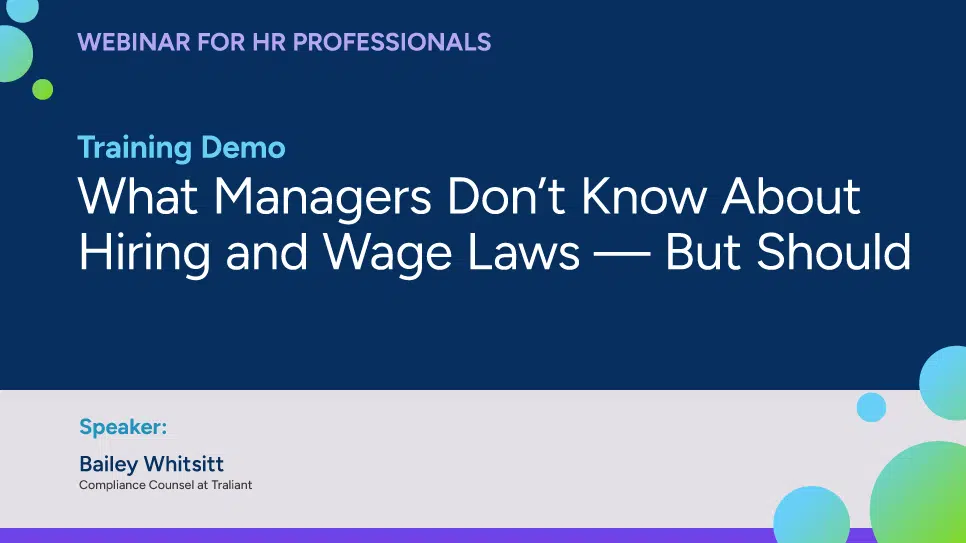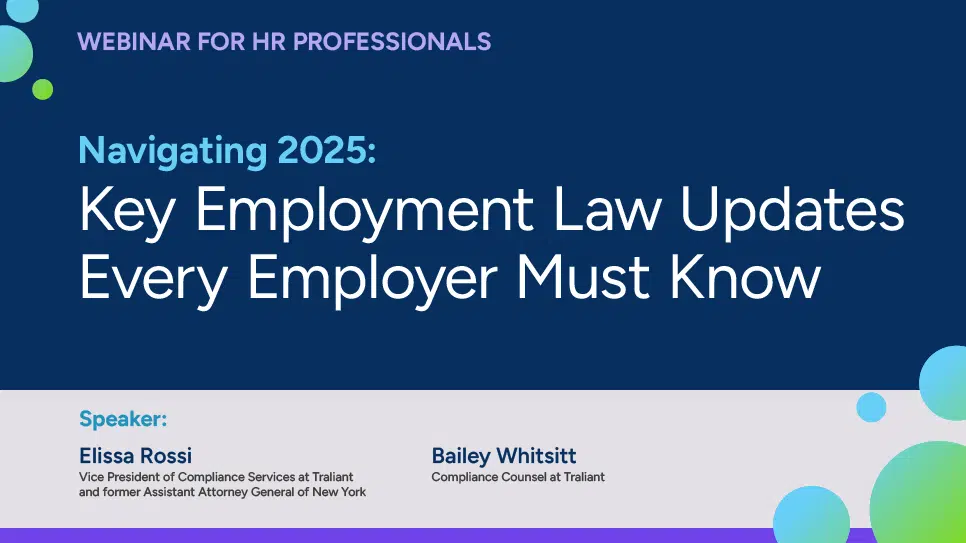

District of Columbia Sexual Harassment Training Requirements
Protect your employees and your organization: Comply with D.C. regulations.
Businesses that employ tipped employees in D.C. are required to provide sexual harassment training to all employees. Additionally, owners and operators of covered businesses must take sexual harassment training.
This training requirement was initially established by the DC Tipped Wage Workers Fairness Amendment Act of 2018 (the 2018 Act), but the 2018 Act’s implementation was contingent on budgetary authorization. However, the DC Council later enacted the Tipped Workers Fairness Clarification Amendment Act of 2020 (the 2020 Amendment), which repealed the budgetary conditions. Under the 2020 Amendment, the law enacting the training requirements became effective December 3, 2020.
The following FAQs are intended to help organizations comply with the DC Tipped Worker training requirements.
FAQs
Who must receive sexual harassment training?
Covered employers must provide training to all employees, including all supervisors and managers. Additionally, all owners and operators of covered employers must attend training.
Do employees who were trained at another employer need to retake the training?
Employees who have received approved training within the two years before their hire date need not retake the training.
Employees who have received approved training within the two years before their hire date need not retake the training.
Once the Office of Human Rights provides training or a list of certified training providers, covered employers must train new employees within 90 days of hire.
What is the deadline for training existing employees?
Employers must train all existing employees within two years.
Must employers provide retraining?
Yes. All managers must be retrained once every two years. Additionally, all owners and operators of covered employers must attend training at least once every two years.
What content must be included in the training?
The training shall include how to respond to, intervene in, and prevent sexual harassment by co-workers, management, and patrons.
Are employers required to provide bystander intervention training?
Yes, the training must include information on how to respond to, intervene in, and prevent sexual harassment
Bystander intervention training provides employees who may see sexual harassment occurring in the workplace with the skills and confidence to intervene and the resources for support if they cannot intervene. Empowering employees to recognize sexual harassment and proactively respond enables a more positive workplace.
Clear Law Institute’s online Positive Workplace training covers the prevention of sexual harassment and all forms of harassment, discrimination, and retaliation, as well as bystander intervention, workplace civility, and bullying prevention.
Can the training be completed online?
Yes, nonsupervisory employees and business owners or operators may take the training online live virtually (through Teams or Zoom). However, management employees must attend in-person training at least once every two years.
What recordkeeping requirements must an employer meet?
Employers must submit certification of training to the Office of Human Rights within 30 business days after an employee, manager, or owner completes the required training. The Office must maintain these records for five years.
Do employers have to pay employees for the training time?
Yes. While the DC sexual harassment training law does not expressly address this issue, time spent taking employer-provided training is generally considered hours worked under federal law.
What if the law changes and my organization’s training courses need to be updated?
While many providers offer training on preventing workplace harassment, few have the legal and instructional design expertise required to comply with harassment training laws such as those in DC.
Clear Law Institute’s more than 1,000 clients sleep well, knowing that we regularly monitor laws around the country to ensure our training stays up-to-date and compliant. Indeed, we have updated our harassment course on numerous occasions in the last few years to comply with new state and local training laws. Significantly, Clear Law does not charge its clients to update course content when legal requirements change.
Required Sexual Harassment Prevention Policy
Covered employers must
-
adopt a written sexual harassment prevention policy that outlines how employees can report instances of sexual harassment to management and to the DC Office of Human Rights,
-
distribute the policy to all employees,
-
post the policy in a conspicuous place accessible to all employees, and
-
submit a copy of the policy to the DC Office of Human Rights.
Required Sexual Harassment Complaint Recordkeeping & Reporting
Covered employers must
-
document all instances of sexual harassment reported to management, including whether the reported harasser was a non-managerial employee, managerial employee, owner, or operator; and
-
file an annual report with the DC Office of Human Rights indicating the number of instances of reported harassment, and total number of reported harassers who were non-managerial employees, managerial employees, owners, or operators.

